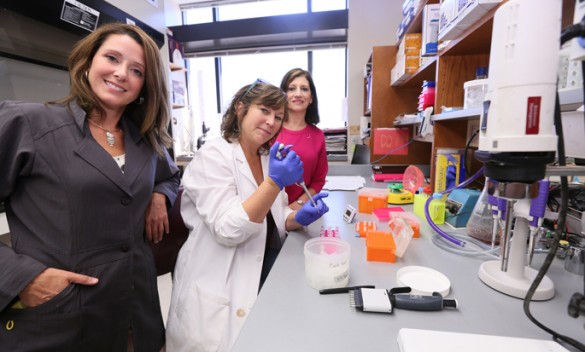
For more than twenty years, Vanderbilt-Ingram Cancer Center’s (VICC) primary source of outside funding has been provided by the National Institutes of Health. But in breast cancer, Susan G. Komen, a nonprofit dedicated to breast cancer research and community services, has been a significant sponsor of research and patient care support.
Komen has provided more than $11 million in grant funding for 21 VICC investigators and 15 trainees in the areas of cancer research, disparities and intervention.
During a daylong event this week for VICC investigators, donors, patients and patient advocates, Judith Salerno, M.D., M.S., president/CEO of Susan G. Komen, said the nonprofit has devoted $898 million to breast cancer research, second only to the federal government.
“I have made it a priority at Komen that we support young researchers because we know that continuity in breast cancer research is critical for success,” said Salerno.
Those grants ensure that young investigators can successfully launch their careers. The Komen support has allowed VICC investigators to garner another $110 million in peer research grants.
The research funding enabled VICC to become a leading center in genetically informed breast cancer medicine, according to Jennifer Pietenpol, Ph.D., B.F. Byrd Jr. Professor of Oncology and director of VICC.
Carlos L. Arteaga, M.D., director of VICC’s Center for Cancer Targeted Therapies and the Breast Cancer Program, and a member of the Komen Scientific Advisory Board, said identification of mutations allows cancer therapies to be targeted at the individual level.
Arteaga described a patient whose tumor had one actionable gene mutation at the start of therapy, and later developed a second mutation that could be treated with a different therapy.
“This is the power of precision medicine and how we can use molecular intelligence to outsmart cancers when they progress like this,” said Arteaga.
Visitors toured the research laboratories of Rebecca Cook, Ph.D., assistant professor of Cancer Biology, and Deborah Lannigan, Ph.D., associate professor of Pathology, Microbiology and Immunology, and of Cancer Biology, and learned about research by Ian Macara, Ph.D., professor and chair of the Department of Cell and Developmental Biology.
While breast cancer incidence has declined slightly in recent years, and most patients with early stage disease and access to care are treated successfully, the annual death rate has remained consistent at nearly 40,000. In those cases, the disease has spread to other parts of the body, and Salerno said those patients often feel ignored.
“I have also made it a priority to bring metastatic disease out of the shadows and into the light,” Salerno said.
Komen is partnering with VICC on initiatives to reduce disparities in outcomes for African-American and poor women. This national health equity initiative will focus on “hot spots” where breast cancer rates are high and patients face challenges in accessing care. Memphis is one of those spots at the top of that list.
Pietenpol said VICC is sharing clinical expertise and is working to provide access to clinical trials for patients through an affiliation with Baptist Memorial Health Care and the Baptist Cancer Center in Memphis.












